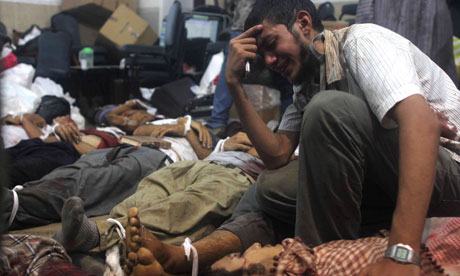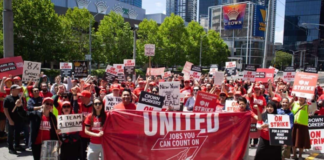The Egyptian Army has committed cold-blooded murder on the streets of Egypt. The official estimate is 830 dead, but journalists on the ground say a more accurate death toll is over 2000.
The army opened fire on sit-ins of supporters of ousted President, Mohammed Mursi, of the Muslim Brotherhood.
The situation in Egypt is complex. The Muslim Brotherhood was elected in 2012, but turned their back on the revolution by banning strikes, cutting wages and increasing repression.

Mass protests of up to 17 million Egyptians confronted Mursi’s rule in July. The Army, led by General Abdul Fattah al-Sisi, stepped to remove Mursi and have installed another neo-liberal government.
Since then, Brotherhood supporters have led sit-ins demanding Mursi’s return.
The Army is using the anger at the Muslim Brotherhood’s leaders to re-assert their total power over Egyptian society. Since July the military regime has whipped up rhetoric claiming Brotherhood supporters are “terrorists”, a label that it is now extended to anyone who upsets business-as-usual.
The Army has been the major force behind Egyptian regime since the military coup of 1952. Some estimate they control between 15 and 40 per cent of the Egyptian economy. They are the direct recipients of $1.3 billion dollars in US aid every year.
As the Egyptian Revolutionary Socialists said in a statement, “[The army’s attack] aims not only to liquidate the Muslim Brotherhood, but is part of a plan to liquidate the Egyptian revolution and restore the Mubarak regime and its military-police state.”
The day before the crackdown, two steel strike leaders in Suez were arrested. They are now facing charges that could see them jailed for 3-5 years. Now the military has declared a state of emergency and a month-long curfew in 13 key districts.
A statement of trade unionists in solidarity with the steel workers rightly accused the government of using “the ‘war on terrorism’ as a pretext for dropping demands for social justice.” The police, too, are trying to regain a foothold. They have banned popular security committees in local neighbourhoods.
These committees were widely used in January and February 2011 after protests forced police off the streets, and were recently re-established.
The interim government is now releasing Mubarak himself from prison.
The Brotherhood
There can be no forgiveness for the policies of the Muslim Brotherhood. A return to Brotherhood rule in Egypt is not the answer.
Until they were deposed, the Brotherhood happily shared power with the Army. But their failure to contain the revolutionary demands for “bread, freedom and social justice” means the Army has now cast them aside and wants to drown them in blood.
The Army has managed to co-opt sections of the revolutionary movement to support their attack on the Brotherhood. Illusions in the Army delivering change are widespread. Millions of new people involved in the July demonstrations were not involved in the previous phases of the demonstrations and strikes that had to confront the Army.
Egyptian socialists are rightly arguing to defend Brotherhood supporters from the military crackdown. If they get away with using these measures against them, they can get away with using them against revolutionaries and trade unionists.
Nor are those killed to blame for their leadership’s policies. As Egyptian revolutionary Hossam el-Hamalawy wrote, “The overwhelming majority of those butchered … by the army soldiers and Central Security Forces troops are from the poor. Look at any names and occupations of those martyrs, released by the field hospitals.”
There are, however, reports of attacks on Coptic Christian churches by Brotherhood supporters, a sectarian move that can only play into the Army’s hands.
The revolution
Mohammed Hussan, a witness to Cairo’s massacre, told New Matilda, “I don’t want Mursi back, but I don’t want Mubarak and the army back again.”
When 17 million took to the streets in July, they were not demanding the return of Mubarak’s regime, but the overthrow of Mursi. The army is just as incapable of meeting their demands as Mursi was.
The fight for a minimum wage, a maximum wage, the nationalisation of industry and basic rights has motivated Egypt’s workers in the biggest strike wave in its history this year.
This fight, for bread, freedom and social justice, can drive opposition to the Army’s counter-revolution.
By Amy Thomas





